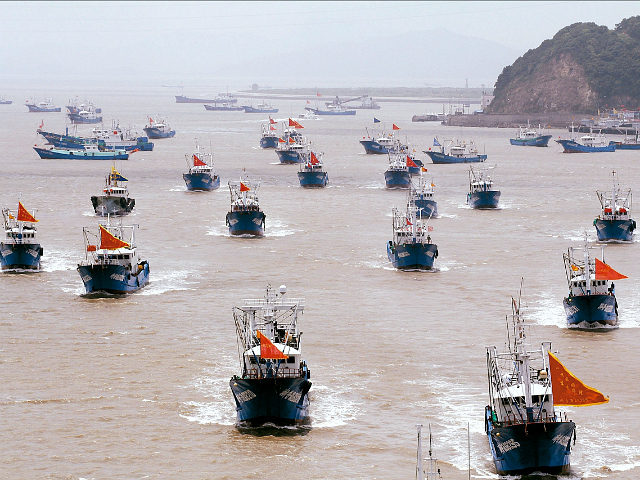A nonprofit environmentalist organization called Oceana released a report on Wednesday that found hundreds of foreign vessels appeared to be conducting illegal fishing operations along the borders of Argentina’s territorial waters, and 66 percent of them were Chinese “fishing vessels.”
China has a penchant for dispatching “maritime militia” commercial craft with weapons on board when it pushes into contested waters, such as those of the South China Sea. Oceana could not obtain many details about the boats by studying thousands of hours of maritime Automatic Identification System data (AIS), but it said the activity of over 800 foreign vessels tracked between January 2018 and April 2021 appeared to be fishing.
“The analysis also revealed that 69% of this fishing activity was conducted by more than 400 Chinese vessels. In comparison to the foreign fleets, 145 of Argentina’s fishing vessels conducted 9,269 hours of visible fishing in this area during the same period — less than 1% of the total amount,” the report observed.
Oceana said the foreign ships switched off their AIS systems and became effectively “invisible” over 6,000 times during the survey period, “hiding fishing vessel locations and masking potentially illegal behavior, such as crossing into Argentina’s national waters to fish.” It traced 66 percent of these “gap events” to Chinese vessels. The remaining ships were largely Korean, Spanish, and Taiwanese.
When the Chinese boats were visible, they accounted for over 69 percent of apparent fishing activity along the edges of Argentina’s territorial waters. Oceana speculated the shadowy foreign ships were mainly fishing for shortfin squid, “which are vital to Argentina’s economy and the diet of numerous commercial and recreational species, such as tuna and swordfish.”
China is among the world’s top exporters of both tuna and swordfish. The country has been buying up African beachfront property for aggressive, environmentally damaging “aquaculture” projects designed to secure food supplies for the larger, more profitable fish in China’s vast fish farms.
Sierra Leone made a deal in May to let China build a sprawling fishing plant and harbor on 250 acres of beach, wiping out some protected rainforests in the process. Chinese-flagged fishing vessels were detected and even seized while operating illegally off the coast of Sierra Leone for years before the harbor deal was made, much like the vessels Oceana monitored off the coast of Argentina.
“Illegal, unreported, and unregulated (IUU) fishing threatens the health of the oceans. The vessels that disappear along the edge of the national waters of Argentina could be pillaging its waters illegally,” Oceana deputy vice president Beth Lowell warned.
The Hong Kong Free Press (HKFP) described Oceana’s findings as “the latest in a series of reports of illegal fishing activity by Chinese fishing vessels in international and foreign waters.”
“Last April, Chinese vessels found pillaging Argentinian waters for squid sparked protests from the country’s fishing industry and calls for stronger legislation against illegal fishing,” HKFP recalled.
“Last July, hundreds of Chinese fishing vessels were detected off the coast of the Galapagos Islands, a UNESCO-protected heritage site. The incident sparked serious concerns among environmental activists of irreversible damage to the oceans’ biodiversity,” HKFP added.
The Argentine coast guard sank a Chinese trawler in March 2016 after catching it fishing illegally within Argentina’s exclusive economic zone. The Chinese ship turned off its lights and attempted to flee into international waters, then tried to ram the pursuing Argentine coast guard ship after warning shots were fired, prompting the coast guard vessel to fire for effect. Another Chinese-flagged ship was caught illegally fishing for squid a few weeks before this incident, but it managed to escape into international waters.
The presence of a Chinese fishing “armada” on Argentina’s maritime border has been well-known for months. In April, President Alberto Fernandez rejected an offer of U.S. assistance to combat illegal fishing, which would have included deploying the U.S. Coast Guard’s most advanced vessel to help patrol Argentine waters. The Fernandez administration insisted its coast guard could handle the situation and said it was negotiating with China to keep the armada out of Argentina’s exclusive economic zone.
The UK Guardian noted that Oceana previously reported on “illegal fishing by huge Chinese fleets along South America’s Pacific coast, affecting Chile, Colombia, Ecuador, and Peru.” The illegal fishing fleets involved in those incidents exhibited similar behavior to those detected off the coast of Argentina, including disabling their automated tracking systems.

COMMENTS
Please let us know if you're having issues with commenting.